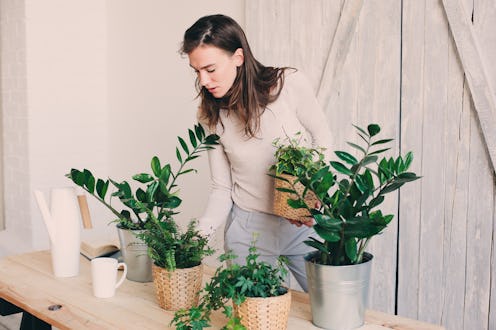Life
5 Psychological Benefits Of Having Houseplants

The other day, my boyfriend caught me giving my monstera a shower. I thought he was sleeping and I’d lifted the massive plant, terracotta pot and all, and brought it into the bathroom. I chatted with it as I squeezed it through the doorway, careful not to rip any leaves, and placed it carefully in the tub. I kept talking as I ran the water, watching as its leaves perked under the lukewarm shower and wondering how it had gotten so big, so fast. Does that sound kind of weird to you? It doesn’t if you’re a plant person.
And an increasing number of people are becoming plant people lately, whether it’s via incredible plant-focused Instagram accounts like The Jungalow or just because they feel like it’s time to get some green in their home.
"For me, what I love about having plants are how much life they can bring into your home," Hilton Carter, who runs a popular plant Instagram, tells Bustle. "They create so much warmth and euphoria, it makes you never want to leave. I also love watching them grow and change overtime. Seeing a plant you've successfully kept alive grow from a young plant to full grown adulthood is exciting. "
And owning plants comes with some serious benefits that go beyond interior decorating. For me, the main psychological benefit of having plants is having something to care for. I like keeping an eye on their new growth; turning them so they face the sun; making sure they get enough (and not too much) water. I like fussing over them and looking at them and knowing that my love and care keeps them healthy and strong.
But anecdotal evidence is one thing. What does the science say? Here are five psychological benefits of having houseplants.
1They Help You De-Stress
According to a 2015 study from researchers at Chungnam National University in Korea, plants may help soothe people by suppressing the sympathetic nervous system. In the study, the researchers had young men complete a computer task or transplant a plant. After, the researchers measured their psychological and physiological states. They found that the men were much calmer after the plant transplanting than after the computer task, suggesting that interacting with plants may hep counteract some of the stress that comes with interacting with technology.
2They Enhance Creative Thinking
And not only do our brains like plants -- they may even like the color green on its own. That's what a 2016 study from researchers at Regent’s University London found. In the study, they had three groups of people who completed a verbal and visual a creative task. One group was in a room with no views of nature; one was in a room with views of nature and plants around them; and the final group was in a room with no views but they used green paper.
The researchers found that the group using green paper and the one with views of nature had increased visual creativity, but not increased verbal creativity. So next time you want to make some art, head outside! (Or at least work some green in there.)
3They Reduce Anxiety
A 2005 study from researchers at National Chung Hsing University found that people were less nervous and anxious when they were in a work environment that included indoor plants or a view of nature. Cheaper than anti-anxiety meds, that's for sure.
4They Clear Your Head
A 2000 study from the University of Reading found that looking at images of foliage improved markers of clearheadedness. Could looking at my monstera be better than coffee??
5They Make You More Productive
Who's more productive: People with plants around or people in "lean" environments? According to a 2014 study from researchers at the University of Exeter, people were 15 percent more productive when there were plants in the office, when compared with "lean" office environments.
Clearly, human beings respond well to plants. Why not grab some leafy green friends of your own?